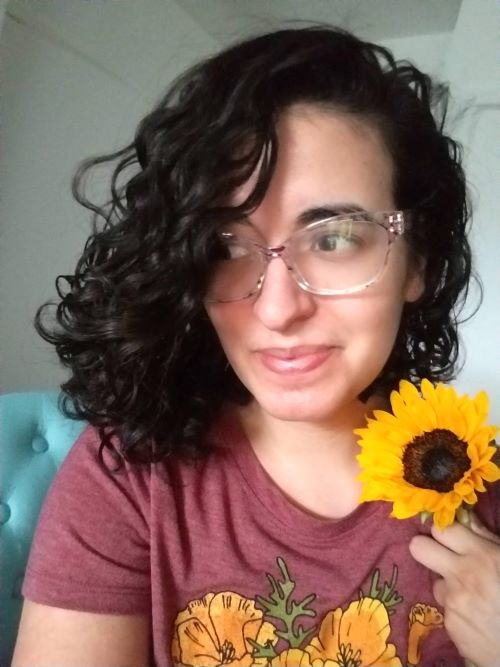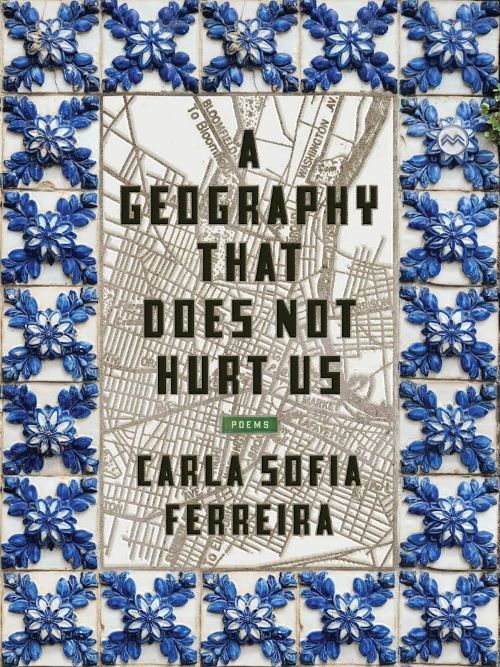As a child I lived two stories above a funeral homeand I spent my summers on the other side of the AtlanticOcean, and I need you to know that none of this is a metaphor.I need you to know that when I tell you my Tia Madalenahad a voice that sounded like a hundred church bells andthat she washed my hair one July morning with fresh olive oil,that the olive oil was real and so were her hands in my hair. I need youto know that this was another language for love— pouring azeite overa child’s head and helping the strands gleam into the summer sunlight.Words are only air folded into sound and I do not know how realthey are anyway. I am not writing to you in the language my parentsspoke as children. Our goodbyes are even half English, half Portuguese,a whole other language. What I am trying to say is what I cannot imagine.I cannot imagine my aunt, her voice a hundred church bells, with lungsdrowning in water that would not save her, a treatment that we knew wouldhurt but did not think would kill. I am unable to imagine her breath like that.I can only hear her voice calling my name Carlinha and I think, every yearI am losing someone who calls me by that name, whose tenderness was warmolive oil in my hair and not merely empty words in air. I am an ocean awaywhen she dies and my parents go to the house that is empty without her ringingvoice. Tio Marcelino serves pão de ló, a cake of five ingredients mostly air—the hands that make it need to firmly whip the egg whites and then gently foldthem so the dough contains enough breath to rise. It is careful work. My father asks,The cake is good, where is it from? and then regrets asking. Tia made it the nightbefore she died and I wish this were all some kind of metaphor because then it couldbe a bad poem and not a terrible truth. For a child who grew up only a few storiesabove so many funerals, I am an adult who is so childish about death: I keep makingthis story, that I will go back one day to the home of those summer weekends in Labruge,that I will ring the bell only to hear her voice filling the air. Instead, we keep these echoesof her hands, working firm and gentle into a kindness that still cares for us, that still calls our names.
Elegy with Azeite e Pão de Ló
—para Tia Madalena, Tio Marcelino, Rita e Tiago.
Feature Date
- June 5, 2024
Series
Selected By
Share This Poem
Print This Poem
“Elegy with Azeite e Pão de Ló” from A GEOGRAPHY THAT DOES NOT HURT US: by Carla Sofia Ferreira.
Published by River River Books on Jan 23, 2024.
Copyright © 2024 by Carla Sofia Ferreira.
All rights reserved.
Reproduced by Poetry Daily with permission.

Carla Sofia Ferreira is a Portuguese-American poet and teacher from Newark, New Jersey. Her first full-length collection, A Geography That Does Not Hurt Us, was published by River River Books in 2024. Author of the micro-chap Ironbound Fados (Ghost City Press 2019), her writing can most recently be found in Grist, EcoTheo, Okay Donkey, The Rumpus, and Glamour among others. A recipient of fellowships from the Sundress Academy for the Arts and DreamYard Rad(ical) Poetry Consortium, her poetry has received several nominations for the Pushcart Prize and Best of the Net. Carla’s work as an English teacher continues to inform and nourish her writing as a practice of community and care.
"We are nowhere and everywhere in Carla Sofia Ferreira's A Geography That Does Not Hurt Us. But never lost. The certainty of Ferreira's uncertainty on home and the heart makes a map for those who know life is 'a fretwork of fragments' we navigate by gut and guile. Both ode and elegy to all the liminal spaces we carry in—and outside—our body, A Geography That Does Not Hurt Us transcends time and place to offer a politic on what it means to be both American and not, woman/almost, descendant and maverick, fado and fiction. Lush and fearless, these poems urge us to unbind memory with pain and pleasure, 'to love with both hands and eyes closed what is already leaving . . .' but ultimately stays through word."
— Marina Carreira
"Joining her practices to the practices of her elders, Carla Sofia Ferreira's poems are an intricately woven work of memory, loss, and transience. I read A Geography That Does Not Hurt Us as an extended gesture that emerges out of the work of her beloveds. With her language, she is beside them, washing the streets, pulling detail through the needle with steadfast attention and care. Her language full of grandmother, full of window, light streaming through the window. In this way, these tender poems work to 'dwell in every possibility of place.' Each one a small miracle."
— Aracelis Girmay
"Carla Sofia Ferreira is writing from a place not listed on maps or star charts, but imprinted in those untamable regions; the heart, the spirit, the soul. Traveling through odes, fados, and elegies, the poetry in A Geography That Does Not Hurt Us is a compass to that very place. A topography and arrangement of deep feeling, deep song, and meditation. The kind that inspires awe, melancolía and sensual lyric music. Ferreira writes, 'This, I think, is my fado: / to love afternoons turned into morning, and / to love with both hands and eyes closed what is already leaving me.' A welcome collection, for a world in need of less hurt."
— Roberto Carlos Garcia
Poetry Daily Depends on You
With your support, we make reading the best contemporary poetry a treasured daily experience. Consider a contribution today.




